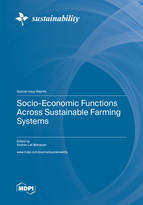Socio-Economic Functions Across Sustainable Farming Systems
A special issue of Sustainability (ISSN 2071-1050). This special issue belongs to the section "Sustainable Agriculture".
Deadline for manuscript submissions: closed (30 December 2022) | Viewed by 27602
Special Issue Editor
Interests: agricultural economics; rural development; regional studies; climate change; sustainable farming; natural resource management; rural livelihood strategies; food security; poverty dynamics; community dynamics
Special Issues, Collections and Topics in MDPI journals
Special Issue Information
Dear Colleagues,
Climate change, natural disasters, and food insecurity are some of the main challenges to agricultural production and supply chains that affect producers, processors, and consumers. Across the world, a shift to more sustainable farmland systems is increasingly regarded as a solution to these challenges. Under the umbrella of ‘shift to more sustainable farming systems’, several actions have been taken, including changes in agricultural land use which can contribute to economic and environmental sustainability and can ensure the livelihood of the producers. Accordingly, successful reforms and execution of policies, plans, and programs on farmlands seem highly important. As intuitive as these aspects might be, the socio-economic functions of these actions are contextual, leaving space academically for further exploration and analysis of effectiveness in terms of practices on the ground and in the arena of policy formulation and implementation. Such analyses can be conducted from theoretical and practical standpoints. The effect of events of a global scale such as, but not exclusively, the current COVID-19 pandemic, increases the need for further scrutiny of the relationships that exist between sustainable farming systems and pandemics, economic and political crises including regional conflicts and the many aspects of globalization, and hazards related to, for example, anthropogenic climate change. These events are not restricted to any one continent nor to developing, emerging, or developed economies.
This Special Issue aims to accommodate research on socio-economic functions across sustainable farmland systems, with a focus on, but not restricted to, practices, policies, and planning for environmental conservation in agriculture, climate-smart agriculture, conventional and biotechonological agriculture which not only mitigate and/or adapt to the challenges of climate change, natural disasters, food insecurity, and conflict but also boost nature-positive production, stabilizes production, and improve the welfare of the producers; processing and marketing of farm produce which ensure the livelihood of the producers, processors, and consumers, and access to safe and nutritious food; integration of nonfarming with farming activities; and building of a society resilient to all kinds of crises and hazards/conflicts.
Academics and researchers from all parts of the world are invited to contribute to this issue on the broad topics outlined above. All types of articles that Sustainability normally accepts (see the Sustainability webpage) will be considered for peer review. I look forward to receiving papers that enhance our understanding of the theme.
Prof. Dr. Keshav Lall Maharjan
Guest Editor
Manuscript Submission Information
Manuscripts should be submitted online at www.mdpi.com by registering and logging in to this website. Once you are registered, click here to go to the submission form. Manuscripts can be submitted until the deadline. All submissions that pass pre-check are peer-reviewed. Accepted papers will be published continuously in the journal (as soon as accepted) and will be listed together on the special issue website. Research articles, review articles as well as short communications are invited. For planned papers, a title and short abstract (about 100 words) can be sent to the Editorial Office for announcement on this website.
Submitted manuscripts should not have been published previously, nor be under consideration for publication elsewhere (except conference proceedings papers). All manuscripts are thoroughly refereed through a single-blind peer-review process. A guide for authors and other relevant information for submission of manuscripts is available on the Instructions for Authors page. Sustainability is an international peer-reviewed open access semimonthly journal published by MDPI.
Please visit the Instructions for Authors page before submitting a manuscript. The Article Processing Charge (APC) for publication in this open access journal is 2400 CHF (Swiss Francs). Submitted papers should be well formatted and use good English. Authors may use MDPI's English editing service prior to publication or during author revisions.
Keywords
- climate change
- food insecurity
- environmental conservation agriculture
- agricultural biotechnology
- processing and marketing of farm produces
- safe and nutritious food
- nonfarm activities
- institutional building
- extension services
- awareness and resilience building
- hazards/conflict
- COVID-19






